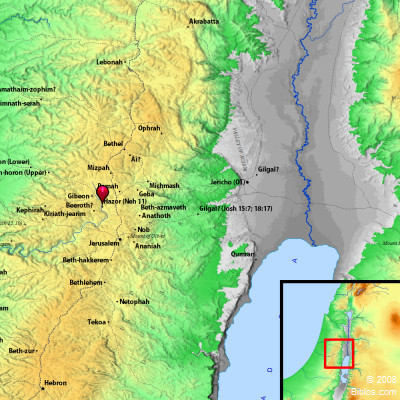Encyclopedia
HAZORha'-zor (chatsor; Nasor; Codex Sinaiticus, Asor, 1 Maccabees 11:67):
(1) The royal city of Jabin (Joshua 11:1), which, before the Israelite conquest, seems to have been the seat of a wide authority (Joshua 11:11). It was taken by Joshua, who exterminated the inhabitants, and it was the only city in that region which he destroyed by fire (11:11-13). At a later time the Jabin Dynasty appears to have recovered power and restored the city (Judges 4:2). The heavy defeat of their army at the hands of Deborah and Barak led to their final downfall (Judges 4:23). It was in the territory allotted to Naphtali (Joshua 19:36). Hazor was one of the cities for the fortification of which Solomon raised a levy (1 Kings 9:15). Along with other cities in Galilee, it was taken by Tiglathpileser III (2 Kings 15:29). In the plain of Hazor, Jonathan the Maccabee gained a great victory over Demetrius (1 Maccabees 11:67). In Tobit 12 it is called "Asher" Septuagint Aser), and Kedesh is said to be "above" it. Josephus (Ant., V, v, 1) says that Hazor was situated over the lake, Semechonitis, which he evidently identifies with the Waters of Merom (Joshua 11:13). It must clearly be sought on the heights West of el-Chuleh. Several identifications have been suggested, but no certain conclusion can be reached. Some (Wilson and Guerin) favor Tell Harreh to the Southeast of Qedes, where there are extensive ruins. Robinson thought of Tell Khureibeh, 2 1/2 miles South of Qedes, where, however, there are no ruins. We may take it as certain that the ancient name of Hazor is preserved in Merj el-Chadireh, Southwest of Qedes, and North of Wady `Uba, and in Jebel Chadireh, East of the Merj, although it has evidently drifted from the original site, as names have so often done in Palestine. Conder suggests a possible identification with Chazzur, farther South, "at the foot of the chain of Upper Galilee. in position more appropriate to the use of the chariots that belonged to the king of Hazor" (HDB, under the word).
(2) A town, unidentified, in the South of Judah (Joshua 15:23).
(3) A town in the South of Judah (Joshua 15:25).
See KERIOTH-HEZRON.
(4) A town in Benjamin (Nehemiah 11:33) now represented by Khirbet Chazzar, not far to the East of Neby Samwil.
(5) A place in Arabia, smitten by Nebuchadnezzar (Jeremiah 49:28, 33).
W. Ewing
